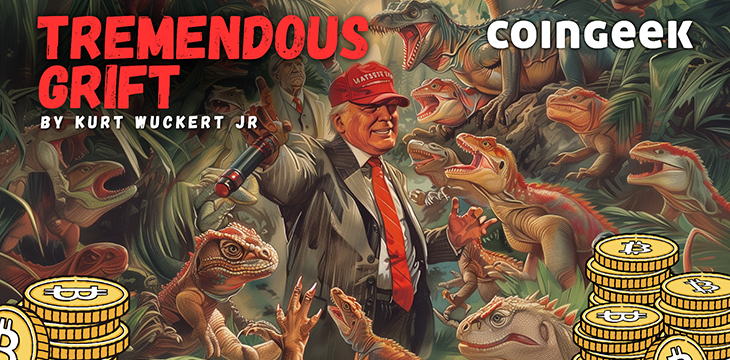|
Getting your Trinity Audio player ready...
|
The origins and evolution of venture capital
Venture capital (VC) has become synonymous with high-risk, high-reward investments in burgeoning industries, particularly technology. However, its roots are deeply entrenched in the post-World War II economic landscape. The American Research and Development Corporation (ARDC), founded in 1946 by Georges Doriot, is often cited as one of the first VC firms. It played a crucial role in financing startups that lacked access to traditional funding sources.
Throughout the 20th century, VC evolved, intertwining with various financial institutions. Sovereign wealth funds and old-world financial titans, such as Rockefeller and Rothschild interests, started to recognize the potential of VC in fostering innovation and economic growth.

These connections facilitated the infusion of substantial capital into nascent industries, shaping the modern VC landscape and the modern surveillance state by creating the military-industrial complex that President Eisenhower warned the American people about in his farewell address.
Through this strategic investment in the tech economy by money from the old-world pillars of power, the lines between the banks, the state, the military, sovereign wealth, and corporate powers have (probably) been blurred irreparably, and now nearly all hot and cold battles are fought from behind computer screens.
Venture capital’s global expansion and influence
Today, venture capital has expanded globally. Sovereign wealth funds from the Middle East and Asia began investing heavily in Western startups, seeking to diversify their portfolios and gain access to cutting-edge technologies. Funds like Saudi Arabia’s Public Investment Fund and Singapore’s Temasek Holdings became major players in the VC arena, often co-investing with Western financial institutions and blurring the lines of national interest in favor of international corporatism.
Notable old-world financial titans also played pivotal roles. For instance, Goldman Sachs (NASDAQ: GS) and Morgan Stanley (NASDAQ: MS) started dedicated VC arms, leveraging their vast networks and financial expertise to identify and nurture high-potential startups. This symbiotic relationship between VC firms and established financial entities facilitated a steady flow of capital, propelling startups to global prominence. However, it also caused a large inequity in the culture of startups, where companies don’t have to create customer value as long as they create shareholder value in the churn of ever-growing fiat wealth.
The role of BlackRock in shaping the future of venture capital
BlackRock, the world’s largest asset manager, epitomizes the influence of institutional investors in venture capital. With trillions of dollars under management, BlackRock’s investment strategies significantly impact global markets. Its venture capital arm has been instrumental in funding a plethora of startups, particularly in fintech, biotechnology, and renewable energy sectors while also strategically weakening their competitors by demanding things like unattainable ESG and DEI policies for their vendors until they are able to buy out and control entire supply chains under their own management.
BlackRock’s approach to venture capital is characterized by a blend of strategic investments and active management. The firm not only provides capital but also leverages its extensive network and resources to support the growth and expansion of its portfolio companies. This hands-on approach ensures that BlackRock remains at the forefront of technological and economic advancements such that their involvement creates success rather than just being “lucky” like other types of investment firms might be.
This allows them to make longer-term investments and focus on engineering outcomes that strategically move capital and resources toward their portfolio in ways other firms can’t resist or mitigate against.
Enter JD Vance
JD Vance, author of “Hillbilly Elegy,” a U.S. Senator and newly announced running mate in the least important election of our lifetimes, is a prominent figure in venture capital. Before entering politics, Vance co-founded Narya Capital, a VC firm focused on investing in Midwest startups.
His journey from being a bestselling author to a venture capitalist and politician underscores the increasing interconnectedness of finance and politics that has been born from the failure of our culture to resist the proliferation of the military industrial complex.

Vance’s investment philosophy at Narya Capital was shaped by his belief in the transformative power of technology and innovation. His firm targeted high-potential startups in traditionally overlooked regions, aiming to bridge the investment gap and spur economic development outside the coastal tech hubs. But it should be noted that he learned the VC business from Peter Thiel—a wolf in sheep’s clothing.
Two-faced Thiel
Peter Thiel is often hailed as a libertarian icon, advocating for pro-freedom and anti-establishment ideals. However, his investment choices and business practices tell a different story. Thiel co-founded Palantir Technologies, a data analytics company that works closely with intelligence agencies and the military. Palantir’s software has been used by the CIA, FBI, and various military branches to conduct surveillance and gather intelligence, raising significant privacy concerns. Critics argue that Palantir’s operations are at odds with the libertarian principles of individual privacy and limited government intervention, revealing a stark contradiction between Thiel’s professed beliefs and his business endeavors.

Additionally, Thiel’s involvement with surveillance and defense companies undermines his libertarian image. His investments in companies prioritizing government contracts over consumer privacy suggest a pragmatic approach prioritizing profitability and influence over ideological purity. For instance, Thiel’s Founders Fund has invested in Anduril, a defense technology company developing AI-driven border security surveillance systems and “predictive policing.” Such investments highlight a willingness to support and profit from state apparatuses that libertarians traditionally oppose.
Thiel also has significant connections to the Bitcoin world. He was an early investor in Bitcoin-related startups through his venture capital firm, Founders Fund. Thiel’s interest in Bitcoin aligns with his libertarian rhetoric, as it offers a decentralized alternative to traditional financial systems. However, this involvement is at least as complicated as that of other controversial investors, as he has ended up largely on the side of the small blocker takeover from the Bitcoin Civil War era. His broader investment portfolio is also telling as it includes companies that could leverage blockchain technology for enhanced surveillance capabilities. This duality in Thiel’s investments paints a picture of a businessman whose actions often diverge from his libertarian declarations, raising questions about the authenticity of his commitment to pro-freedom politics and by proxy, I’m not exactly excited to see one of his protegés chosen to run for the office of Vice President.
The Trump-Vance connection and the blockchain pivot
JD Vance’s close ties with the venture capital world likely facilitated his involvement with Donald Trump’s 2024 presidential campaign. Reports suggest that Vance has been advising Trump for months, contributing to a significant policy shift. Trump, who was previously critical of Bitcoin and blockchain technology, has recently adopted a pro-Bitcoin stance. This pivot is seen as a strategic move to align with the interests of influential venture capitalists and tech investors like BlackRock’s Larry Fink— who Trump has named for a possible Cabinet Secretary position in his administration amid rumors that he may also hold BTC in the U.S. strategic reserve.
If Trump picks Larry Fink as Treasury Secretary, we’re getting a strategic reserve. #Bitcoin goes to the moon. Western countries follow. Germany buys back at $1M per coin. pic.twitter.com/GgRMtCcRhH
— Thomas | heyapollo.com (@thomas_fahrer) July 22, 2024
The influence of venture capital on political campaigns is not new. However, the Trump-Vance alliance highlights a deeper, more intricate web of financial and political interests. Vance’s connections to prominent VC investors, many of whom have substantial stakes in blockchain firms, have undoubtedly played a role in shaping Trump’s new position on Bitcoin.
The co-opting of Bitcoin by a financial cabal
Bitcoin, originally envisioned as a decentralized digital currency, has increasingly come under the influence of major financial players. Companies like Digital Currency Group (DCG), AXA Ventures (NASDAQ: ZAFPEX), Baillie Gifford (NASDAQ: BLGFF), and iFinex (Tether’s parent company) have substantial investments in the blockchain space. These entities, working similarly to BlackRock in traditional markets, have formed a financial cartel in the blockchain economy and wield significant control over Bitcoin’s market dynamics.
DCG, founded by Barry Silbert, is a prime example of this influence. With investments in numerous Bitcoin-related companies, DCG has a vested interest in shaping the future of Bitcoin to the value of their LPs. Similarly, AXA Ventures, MasterCard (NASDAQ: MA), and Baillie Gifford, traditional financial powerhouses, have ventured into the blockchain market, further entrenching institutional control over BTC, while companies like iFinex build a central bank of the blockchain economy that I often call the “Tetheral Reserve Bank” because they mix everything awful with central banking and everything awful about corporatism into one symbiotic nightmare of the future of monetary politics and power.
It’s almost guaranteed that, if you follow the money, your favorite blockchain industry influencer actually works for the iFinex/Tetheral Reserve Bank. pic.twitter.com/lrP9kfMbMX
— Kurt Wuckert Jr | GorillaPool.com (@kurtwuckertjr) June 17, 2024
The corruption of venture capital and its implications
Consolidating power among a few influential VC firms and financial institutions raises concerns about market manipulation and ethical governance. The involvement of these entities in the Trump-Vance campaign underscores the potential for financial interests to shape political agendas. This intertwining of finance and politics can lead to policies that favor the few at the expense of the broader public, and we have been warned about this confluence since the early 1960s.
The venture capital industry’s heavy influence on BTC and the Trump campaign illustrates a broader trend of financial power consolidating in the hands of a select group. This concentration of influence can undermine the foundational principles of decentralization and democratization that Bitcoin and other technologies were built upon—as if they hadn’t been bastardized enough already.
The venture capital industry has played a pivotal role in shaping the modern economy, driving innovation, and fostering technological advancements. However, its growing influence, particularly through connections with sovereign wealth funds and financial titans, raises questions about the concentration of power and its implications for economic and political landscapes.
The involvement of figures like JD Vance in both venture capital and politics highlights the intricate web of interests that drive policy decisions. As Trump pivots to a pro-Crypto stance, influenced by venture capitalists and financial institutions, the need for transparency and ethical governance in both finance and politics becomes increasingly critical. The sad thing is that Bitcoin was designed to fix these sorts of problems, and BTC has been so deeply undermined that it is being used as a tool of control instead of a tool for freedom.
Understanding these dynamics is essential for ensuring that the benefits of technological innovation and economic growth are equitably distributed and that the principles of decentralization and democracy are upheld in the face of growing financial influence.
But I’m not optimistic.
This week, Trump will give a big speech at BTC 2024 in Nashville alongside other grifters and thieves and sell access as part of a campaign fundraiser among the small blocker elite. He will likely make a few surprise announcements about his new allies from the predatory PayPal (NASDAQ: PYPL) Mafia.
God help us!
Watch: Calvin Ayre is all in on Metanet—the game-changing fusion of enterprise blockchain, AI & IPv6

 02-15-2026
02-15-2026 




